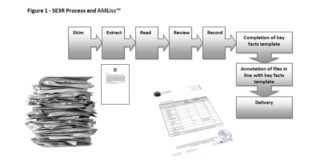AMLiss™: Managing the risk in translation
Organised criminals generate huge sums of dirty money that they must make appear legitimate if they are to use it. They need willing or unsuspecting professionals such as lawyers, accountants, bankers, company formation agents, real estate agents, casino managers and high value property dealers to help them to do this.
Visit our new regulatory compliance industry page.
These professionals are vital gatekeepers in the fight against crime and as such the law requires them to take action to prevent money generated by terrorists and other criminals from making the cash look like it came from lawful activity. Many firms have highly effective measures in place but some do not and in our increasingly globalised world this exposes them to risk.
The Solicitors Regulation Authority (SRA) has reported seeing some poor Customer Due Diligence (CDD) in law firms which exposes them to the risk of infiltration by organised crime groups and Politically Exposed Persons (PEPs). In September 2014, Paul Philip, SRA CEO and Donald Toon, Director of the NCA Economic Crime Command, announced their plans to work together to ensure law firms have robust Anti-Money Laundering (AML) systems in place and warned of the consequences if serious failures are identified.
Assisting criminals is a serious offence and those in regulated professions know the consequences of becoming involved in such activity. They know that suspected money-laundering and terrorist financing risks must be identified, assessed and mitigated. However, this process can be especially challenging when information is supplied verbally or in writing by a client or other source in a language other than English. In these circumstances, there is a heightened risk that the firm will fail to identify suspicious activity such as the presentation of a false certificate or a deliberately mistranslated document.
AMLiss™ is a 3 Tier multilingual assurance solution developed by Today Translations and experts in linguistics and economic crime investigation. It is designed to assist regulated professionals to identify risks that are unseen or hidden within a foreign language document or lost when communication is made via an interpreter.
Mitigating risk
Keeping accurate, up to date records of initial and ongoing CDD is central to an effective risk-based AML procedure. Applying controls such as translating documents and using qualified interpreters can mitigate risks by providing independent certification of translated content and expert opinion on the validity of information. However, these services can be costly and inconvenient to the client and the firm. It can also result in the unnecessary translation of large volumes of information that adds little value to the CDD process.
This issue can be overcome by using the language skills of those within the firm where resources exist and time permits. However, this carries the risk that the internal resource is insufficiently qualified to spot suspicious activity, may become exposed to undue influence or has a conflict of interest e.g. by providing information or advice to a client that they are not qualified or permitted to give.
When a client is fluent in English and is content to do so, it may be appropriate to communicate with them solely in English. The risk associated with this approach is that the client does not have sufficient grasp of technical terms, leading to a future dispute as to what was said and asked for in terms of CDD.
Organised criminals may introduce another intermediary to disguise their activity and give them greater credibility. When a client communicates through an agent or third party you do not know, the risks associated with the third party should also be identified, recorded, assessed and managed.
The decision to translate or not
The decision on which language to communicate with a client is a matter for the regulated professional. This will be influenced by a range of factors and the underlying principle is one of fairness to the client. Guidance from Regulators and professional bodies provides some clarity for example:
* Principle 7 of the Financial Conduct Authority’s Guiding Principles for Business states, “A firm must pay due regard to the information needs of its clients, and communicate information to them in a way which is clear, fair and not misleading”.
* Principle 1 of the SRA’s Code of Conduct states, “You (a Solicitor) must act in the best interests of your client”.
Why today translations?
Serious crime can have serious consequences for you, your business and society as a whole. To help protect clients from risks, Today Translations has assembled the finest network of linguists and advisors with the skills and experience to help clients to mitigate risk. All act with the highest integrity and many are familiar with operating in challenging environments.
Based in secure offices close to the Bank of England, Today Translations was the first specialist language firm to focus on security and compliance. It is one of the few translation companies in the world to achieve full certification for its data security systems in accordance with ISO27001 the international standard. Many agencies claim to work to this standard but the people and systems at Today Translations have been independently inspected and verified to show that data security controls are in place and are robust.
Today Translations are the language company of choice for some of the world’s leading brands and organisations who want language services of the highest quality that are underpinned by security controls that protect their data throughout the supply chain.
AMLiss™: Efficient and cost effective
The AMLiss™ solution offers three tiers of service designed to assist you to identify and manage multilingual risks. These are summarised below:
AMLiss™ Tier 1: SE3R review and identification of key information
Tier 1 balances the requirement for appropriate compliance management against the cost of doing business by professionally translating only the information that is needed. This significantly reduces the cost of translation and adds value by providing the Money Laundering Reporting Officer (MLRO) with a translation of the relevant information that is independently certified by a qualified linguist.
This is accompanied by any observations the linguist may have regarding the document based on their experience and cultural knowledge. This can be especially useful when conducting enhanced due diligence. As the translation is carried out by a qualified professional, it mitigates the confidentiality risk associated with using free online translation tools such as Google and Bing which leave a public online footprint. Identification and recording of the required key information contained within a set of documents will be reviewed following the SE3R methodology as illustrated below in figure 1.

The relevant information is identified and extracted from the source document. The Key Text is then translated and recorded in the Key Facts template with a cross-reference to where this information can be found in the source document. Once completed, the content of the Key Facts template will be certified, citing the unique reference number for audit and evidential purposes and bear the official stamp of Today Translations. The Key Facts template can be tailored to your requirements.
This form includes a section for “Observations” where the linguist can highlight concerns regarding information inconsistencies or “abnormal” looking documentation e.g. birth certificates, passports and certificates of incorporation.
AMLiss™ Tier 2: verification of facts
Tier 2 provides additional insight to assist the MLRO to assess risk by verifying facts. The sophisticated criminal will go to great lengths to disguise the beneficial ownership and source of their assets and wealth. A skilled linguist with local knowledge and research and analytical skills can help you spot irregularities in documents or verbal conversations by checking facts that may indicate suspicious activity. This additional insight may be appropriate when information comes to light during Know Your Customer (KYC) checks or in the form of an observation by a linguist conducting a Tier 1 document review.
The nature and extent of the research and analysis will be defined in consultation with the client and strictly managed by Today Translations. This can range from open source key word research to acting as a direct support resource to the AML teams.
AMLiss™ Tier 3: AML multilingual risk management training
Tier 3 services provide AML professionals, partners and client facing staff with an understanding of the risks associated with assessing multilingual documents in the regulatory management arena. Content includes:
* The threat from organised crime and PEPs
* The specific risks associated with multilingual documents and communication
* Criminal typologies employed to circumvent AML procedures
* The consequences of failing to identify suspicious activity
* Examples of good and poor practice
* Listening for what is not said: Provision of investigative tools and techniques that professionals can apply to mitigate the risks associated with processing multilingual information.
Free compliance resources
The City of London Police selected Today Translations to provide language and event support services for their first European Union Cross Border Anti-corruption Task Force conference held in London in 2014. You can download a series of free multilingual anti-corruption documents that Today Translations provided for this event.
For more information on controls to prevent Bribery and the British Standard BSI1050 see http://www.bsigroup.com/en-GB/BS-10500-Anti-Bribery/
Working together to improve security
Regulatory compliance can appear cumbersome and bureaucratic but in reality, a common sense approach rather than a complex tick box exercise is the most effective approach to mitigate risk. Today Advisory is an operational division of Today Translations and partners with specialists to protect individuals and organisations from harm. You can download two free audio files and a presentation by visiting: The Time Bomb Ticking in Translation and Who’s afraid of the Cyber-Wolf For the UK government guide to the current consolidated list of asset freeze targets visit https://www.gov.uk/government/publications/financial-sanctions-consolidated-list-of-targets
The following are a series of links to key pieces of legislation, guidance and policy documents:
- USA Department of Justice Resource Guide to the U.S. Foreign Corrupt Practices Act [on justice.gov]
- Directive (EU) 2015/849 on the prevention of the use of the financial system for the purpose of money laundering and terrorist financing (4th AML directive)#
- Regulation (EU) 2015/847 on information accompanying transfers of funds (the Wire Transfer Regulations)
- The FCA issued reviewed guidance on anti-money laundering in April 2015
- Publication on preventing money laundering [on Gov.uk]
- Treasury approved guidance on money laundering regulations
- Business tax guidance on money laundering regulations [on Gov.uk]
- Law Society risk compliance guidance on anti money laundering
- ICAEW guidance on money laundering regulations
- Gambling Commission guidance on prevention of money laundering
- Money Laundering Regulations 2007 for insolvency practitioners [on Gov.uk]
- PSC requirements for companies and limited liability partnerships [on Gov.uk]











